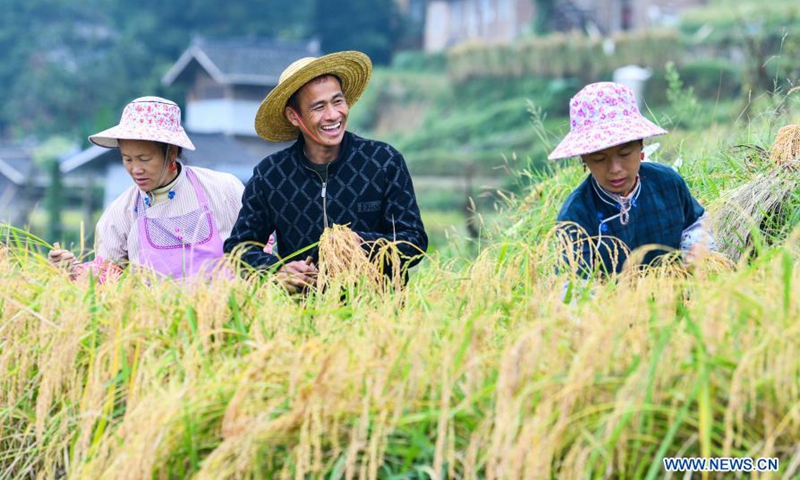An open society and closed society
We in India seem to read more about Chinese agriculture than about the Indian agriculture!
There is revolutionary agri research news from Beijing and we in India must take note of this new developments. Why China is ahead of India in agri research? TIME HAS COME TO TAKE EFFORTS TO UNDERSTAND MORE ABOUT WHAT CHINESE AGRI RESEARCH IS LIKE!
We have read so far in almost consecutive days about gene-edited seeds that have many advantages than about what we read about GM seeds. Even about the latter, we don’t know much, what is the status of the present GM seeds research and other high tech agri research activities. We deal and interact with the Indian agricultural universities, there are nearly a hundred-odd universities, with so many other agri institutes and colleges, considering the numbers we should assume, we are sure the Indian general public would surely also assume that much original research is going on.

But where is the outlet, agri journals or scientific papers or reporting in the mainstream daily newspapers that would report and enlighten the authorities, the policymakers? And leaders of other sorts, the real genius of the educated sections would only get further benefits if only such flows of information marks our daily lives and actions.
Alas! It is a shame that we read at least in one or two mainstream business papers about serious research activities from countries like China. Somehow such critical information comes through by other agencies, often Western news providers that we read. Some original research news is getting published and we count our luck. Whenever we see such good news, gene-editing for newer plants and crops, for faster improvement of crops. The country has come out with a raft of trial rules. This is to overhaul, the country’s seed industry. Also, the country has come out to a clear path for approval of the GM crops. Scientists ‘edit’ or alter genes already in a plant to improve its performance, aiming for better yields or increased nutrients.
Rules for approval.
Gene-editing for new seeds seems to be the future goal of any high-level agri genetics and genome research. JILL Banfield, University of California and Jennifer Doudna, winner of the Chemistry Nobel Prize are the two names to be watched and followed. Now, the Business Standard newspaper (which published the latest information in four-column page news! Where are the Indian news? By sharing some such very important and frontline information the whole humanity benefits. Our interactions with the Indian Agri universities, we should confess is very disappointing.
There is no urgency or fire in their day to day activities. No one lifts the phone and reach the top bosses is next to impossible. Unless the Vice-chancellors show some interest and dynamism how do we hope to reach self-sufficiency in food production and also go out to serve the vast hungry populations? Now, coming to the current technological revolutions from the IT industry we don’t see the very same enthusiasm to transform their university activities to the agriculture research.
Online non syllabus education and interaction, the only future
Online teaching and education penetration in the future and applies not only to agriculture but much more important to education in agriculture, medicine and engineering and other related professional areas as well.
Medical facilities cry for attention that out of the 180 odd countries that are ranked in providing medical facilities India ranks only at a poor 140 odd place and this is a gigantic issue where not one man or one state can achieve anything. Now comes such regional issues like NEET allocations and reservation categories of young learners. India must be seen as part of the larger world. The best education standards and research are undoubtedly are to be found even today in the Western world. This applies more to education in general and in particular in some specialisations.
In agriculture, we seem to adopt easily the techniques from Israel and Netherlands and the many US agri universities like Cornell and others. Now, coming down to the earth issues like farmers future etc.
There is much to say and much to debate and find practical solutions on the ground. Rakesh Tikait, the formidable leader of the farmers in the Jat stronghold of UP, Punjab and Haryana has been said that farmers of India are one family and farmers have no caste and they are one and their problems are one only.
Farming today is unprofitable and Indian farming is also transforming rapidly. The very many statistics are boring and tiresome and they are also not believed by anyone. We seem to manipulate the ground level realities also.
The UP election where the BJP seems to have bounced back is a good sign and let us hope, yes, we have only hope as for the action we have to be skeptical somewhat the next big unresolved problem is how to make the uneconomic farm holdings a productive asset. The idea of farm producers. organisations (FPO) are only an idea and that too in very primitive times we should not forget the tortured history of the farming co-operatives (of the Nehru era) and also much more debated, the map indicated Soviet-style farm collectives! No one would dare to go near such ideological firewalls!
Our guess is that the future path lies somewhere in-between these extremities. We may have to go for more farm subsidies, the world over countries in democracies, the EU, USA and other countries pay a heavy farm subsidy and India have no other alternatives. More and more farm subsidies and handouts may be the short-term solutions.
Image Source : www.globaltimes.cn